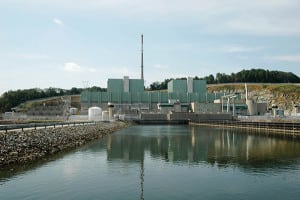Courts
-
Legal & Regulatory
The Courtroom Risk No One in Power Generation Can Afford to Ignore
In an industry grappling with decarbonization mandates, volatile energy markets, and supply chain uncertainty, another threat has quietly emerged with the power to upend everything: the courtroom. Mega verdicts—jury awards exceeding $10 million—are not new. But the scale, frequency, and unpredictability of these rulings are escalating. According to a 2025 corporate verdicts report published by […]
-
Commentary
Powering the Future Without Paralyzing It
The future of energy is rapidly evolving. The explosion of artificial intelligence (AI) and the enormous energy infrastructure it demands will continue to drive unprecedented electricity needs. Goldman Sachs projects that U.S. power demand could grow by as much as 20% by the decade’s end, in large part due to the construction of data centers. These […]
-
Legal & Regulatory
Post-Chevron Ushers in ‘New Normal’ For Regulated Community
The U.S. Supreme Court recently overturned the longstanding Chevron doctrine, a foundation of administrative law for 40 years, when it ruled on Loper Bright Enterprises v. Raimondo . The impacts on a wide
-
Courts
The Chevron Deference Is Dead. What Does It Mean for the Power Sector?
The U.S. Supreme Court on June 28 overturned the Chevron doctrine—a forty-year-old precedent—significantly curtailing the power of federal agencies to interpret ambiguous statutory provisions, even in areas of agency expertise. The landmark 6–3 decision could have far-reaching effects on the power industry, with specific impact on sweeping energy regulations from the Environmental Protection Agency (EPA) […]
-
Legal & Regulatory
Biden Administration Rolls Out ‘Durable’ WOTUS Definition in Final Rule
The Biden administration has rolled out in a final what it says is a “durable” definition of “waters of the U.S.” (WOTUS), potentially capping a legal and political battle that has raged for nearly two decades. The final rule issued by the U.S. Environmental Protection Agency (EPA) and the U.S. Department of the Army on […]
-
Wind
Ruling Issued in GE’s Legal Dispute with Siemens Gamesa—and the Winner Is?
The U.S. International Trade Commission concluded its investigation into a complaint filed by GE against Siemens Gamesa Renewable Energy (SGRE) concerning the importation “of certain variable speed wind turbine generators and components thereof.” In its ruling, the commission found that SGRE violated section 337 of the Tariff Act of 1930, as amended, and it issued […]
-
Coal
Ameren to Close 1.2-GW Coal Power Plant by March 2024, 15 Years Early
In a Dec. 14 filing with the U.S. District Court for the Eastern District of Missouri, Ameren Missouri announced its intent to retire two 600-MW units at the Rush Island Energy Center 15 years earlier than previously planned due to “changed circumstances since the Remedy Ruling.” The court’s remedy ruling, delivered on Sept. 30, 2019, […]
-
Nuclear
Former SCANA CEO Will Land in Prison as Result of V.C. Summer Nuclear Project
Kevin B. Marsh, former CEO of SCANA Corp., was sentenced to two years in federal prison after pleading guilty to conspiracy to commit mail and wire fraud related to the V.C. Summer nuclear expansion project. Marsh is the first defendant in the case to be sentenced as a result of the investigation. However, the U.S. […]
-
International
The Tsunami Coming for Mexico
Although Mexican economic history shows moments of tension between the private sector and the federal government—for example, during the administration of President Luis Echeverría (1970-1976)—never in the modern era has such tension reached the levels experienced at this time. The attacks on the private sector, including foreign investment, that the current federal administration has carried […]
-
POWER Podcasts
Is It Safe to Invest in Mexican Energy Projects?
In late 2013, Mexico embarked on a path to transform its energy markets. Then-President Enrique Peña-Nieto oversaw constitutional reforms that ended state-run monopolies, and opened Mexico’s power market to competition and investment from foreign and private companies. By most accounts, the policies were highly effective in spurring investments in renewable energy and efficient natural gas-fired […]
-
News
Power Co-op Files Bankruptcy After $2.1 Billion ERCOT Bill
The group considered Texas’ oldest and largest electricity cooperative has filed for Chapter 11 bankruptcy protection, saying it can’t pay money wanted by the state’s grid operator in connection with power outages during a major winter storm that hit in February. Brazos Electric Power Cooperative filed its bankruptcy petition March 1 in the U.S. Bankruptcy […]
-
IIOT
Blockchain and Energy Innovation Marches On
Even in a pandemic, energy innovators are developing blockchain technology to implement powerful changes. From automating crude oil trading to amplifying the impact of renewable energy sources, innovations harnessing blockchain technology are likely to change the energy industry in profound ways. Inventors, enterprises, and investors who act today to obtain patent protection for their early […]
-
Coal
THE BIG PICTURE: EPA Regulatory Roundup
Over its 50-year history, several rules issued by the U.S. Environmental Protection Agency (EPA) have reshaped the power sector. But for at least a few modern rules, the road has been full of turns. Notes: CAA = Clean Air Act; BSER = best system of emission reduction; CO2 = carbon dioxide; GHG = greenhouse gases; […]
-
Coal
EPA Changes Closure Requirements in Coal Ash Rule
The U.S. Environmental Protection Agency (EPA) on July 29 finalized several changes to the regulations for disposal of coal combustion residuals (CCRs), or coal ash, from electric utilities. The changes include giving utilities more time to design clean-up and closure plans for their coal ash storage sites. The changes stem from an opinion issued Aug. […]
-
News
Judge Approves PG&E Bankruptcy Exit
A federal judge in California has approved Pacific Gas & Electric’s plan to exit bankruptcy, clearing the way for the utility to compensate victims of a series of wildfires in the state that left more than 100 people dead in 2017 and 2018. The action by U.S. Bankruptcy Judge Dennis Montali on June 20 authorized […]
-
Nuclear
Exelon’s Peach Bottom Nuclear Plant Licensed for 80 Years—Will It Make It?
The U.S. Nuclear Regulatory Commission (NRC) granted a 20-year license extension for Peach Bottom Atomic Power Station Units 2 and 3. The extension authorizes the two reactors—both of which began commercial operation in 1974—to continue operating through 2054. “We are pleased with the NRC’s decision to grant a subsequent license renewal for Peach Bottom Units […]
-
News
Mixed Reactions to FERC’s Recent MOPR Order from Power Generators
On Dec. 19, the Federal Energy Regulatory Commission (FERC) directed PJM Interconnection to dramatically expand its Minimum Offer Price Rule (MOPR) to nearly all state-subsidized capacity resources, including renewables backed by state portfolio standards. It’s the latest of a series of dramatic revisions to the grid operator’s rule, which essentially functions to provide a minimum […]
-
News
EPA Overrides Subpart D in Newly Proposed Federal Coal Ash Permitting Rule
Only “high hazard” CCR units will be subject to immediate compliance deadlines under a newly proposed Environmental Protection Agency (EPA) rule that revises federal permit requirements for the management of coal combustion residuals (CCRs) at power plants. If finalized, the rule will apply to all coal facilities in Indian country and the 48 U.S. states […]
-
Business
Hitachi Exiting MHPS; MHI Will be Venture’s Sole Owner
Japanese technology conglomerate Hitachi will withdraw from Mitsubishi Hitachi Power Systems (MHPS), a joint venture it established in 2014 with another power equipment giant, Mitsubishi Heavy Industries (MHI), over a dispute stemming from construction of two massive defect-ridden coal plants in South Africa. Under a Dec. 18-announced settlement reached by MHI and Hitachi, Hitachi will […]
-
News
EPA Reinterprets ‘Ambient Air,’ Further Tweaks New Source Review
The Environmental Protection Agency (EPA) has finalized a change to a long-standing policy interpreting “ambient air”—a foundational concept under the Clean Air Act that applies to all types of air pollution, from ground-level ozone, particulate matter, and greenhouse gases. While the agency framed the change as part of a suite of actions to reform New Source […]
-
News
EPA Proposes Revisions to Two Obama-Era Rules: Effluent Limitations Guidelines and Coal Ash
The Environmental Protection Agency (EPA) has issued long-awaited proposed revisions of two 2015 Obama-era rules that apply to effluent limitations guidelines (ELGs) for steam electric power plants and coal combustion residuals (CCR) management by electric utilities. The agency coordinated the release of the two related revisions, which apply overwhelmingly to coal-fired steam power plants, after […]
-
News
States to FERC: Promote Market Designs That Recognize State Priorities
Attorneys general from 11 states ramped up pressure on the Federal Energy Regulatory Commission (FERC) to recognize state policy goals as it makes decisions related to market design, siting of new gas pipelines and storage facilities, and grid reliability. The measure is the latest in a string of recent pushes by states to ensure federally […]
-
News
Judge: Court Will Consider Rival Proposal for PG&E Reorganization
A federal bankruptcy judge on Oct. 9 ruled that Pacific Gas & Electric (PG&E), California’s largest utility, does not have the sole right to determine the terms of its reorganization. Judge Dennis Montali said those who support a rival proposal, which was devised by a group of the utility’s creditors, can have their plan considered. […]
-
News
Investing in African Energy—Weighing Risks and Rewards
Foreign energy companies are investing in Africa as that continent builds out its power generation infrastructure. But there are risks to those investments, as some governments—Angola, Tanzania, and Libya
-
Business
Public vs. Private: The Boulder Case
In my “Speaking of Power” column last month, I explained that JEA, a community-owned utility in northeast Florida, is contemplating privatization. One of the reasons JEA is considering the change is that
-
News
Vistra Will Close Another Illinois Coal Plant
A Vistra Energy subsidiary on Sept. 16 said it will close the nearly 60-year-old E.D. Edwards coal-fired plant in Bartonville, Illinois, by year-end 2022 under a settlement between the company and environmental groups the Sierra Club, the Natural Resources Defense Council, and the Respiratory Health Association. The groups made a joint announcement Monday of the […]
-
News
Nine Utility Companies Suing Trump Over Emissions Rule
A coalition of nine utility companies is suing the Trump administration over its plan to replace the Obama-era Clean Power Plan. New York-based Consolidated Edison said the Affordable Clean Energy, or ACE, rule undermines efforts the companies already have in place to cut greenhouse gas emissions from power generation. The companies, who call their group […]
-
News
PG&E’s Reorganization Plan—Cap Wildfire Liabilities at $18 Billion
Pacific Gas & Electric (PG&E) wants to cap its liabilities from damages caused by California wildfires at about $18 billion, according to the reorganization plan filed by the bankrupt utility September 9 in federal court in San Francisco. The amount is less than half what creditors, including insurance companies and wildfire victims, say they are […]
-
News
22 States, Environmental Groups Mount Legal Challenges to EPA ACE Rule
A coalition of 22 states and seven local governments on Aug. 13 filed a lawsuit against the Environmental Protection Agency (EPA) over its Affordable Clean Energy (ACE) rule, which the Trump administration finalized in June to replace the Obama administration’s legacy Clean Power Plan (CPP). Separately, 10 public interest groups filed a petition on Aug. […]
-
News
EPA Delayed on Proposed ELG Revisions for Steam Power Plants
The Environmental Protection Agency (EPA) is behind on its proposed revisions to the Obama administration’s effluent limitations guidelines (ELGs) for steam electric power plants. In an e-mail to POWER on July 9, the EPA confirmed that the agency was still “working expeditiously” to complete the proposed rule, and it has yet to submit it to […]




























